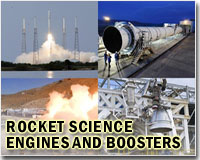 |
Washington (AFP) June 4, 2010 A privately owned rocket successfully blasted off on its first flight Friday, marking a significant milestone for the space industry in the race to develop commercial carriers. SpaceX's Falcon 9 rocket blasted off in mid-afternoon from Cape Canaveral in Florida, reaching Earth orbit as planned nine minutes into the flight. "All in all, this has been a good day for SpaceX and a promising development for the US space program," said Robyn Ringuette of SpaceX, who provided commentary on the launch from the firm's headquarters in Hawthorne, California. The two-stage rocket delivered the Dragon capsule, a mockup of the company's spacecraft aimed to eventually facilitate human space travel, into orbit after a 9.5-minute trip. The first and second stage of the white, 180-foot (55-meter) tall rocket separated successfully just three minutes and six seconds into the flight. "Congratulations to Space X on today's launch of its Falcon 9 launch vehicle," NASA Administrator Charles Bolden said in a statement. "Space X's accomplishment is an important milestone in the commercial transportation effort and puts the company a step closer to providing cargo services to the International Space Station." Technical glitches initially delayed the launch, including an automatic computer override of the system that led SpaceX to abort its first attempt. The launch represented a key test in developing commercial launchers capable of ferrying cargo and astronauts to the orbiting International Space Station (ISS). It came as President Barack Obama seeks to convince a reluctant Congress of the merits of his decision in February to cancel the Constellation program -- designed to return US to the moon by 2020 -- which effectively killed the Ares 1 rocket. He has turned to the private sector to help fill the gap after the space shuttle fleet is grounded later this year, and before a new generation of spacecraft is developed. Obama has proposed spending six billion dollars over five years to help the private sector develop reliable and affordable launchers to transport cargo and US astronauts to the International Space Station. During the transition period, the United States will depend on Russian Soyuz rockets for access to the ISS -- unless the private sector can propose viable launchers. The president visited SpaceX installations at Cape Canaveral during an April visit to the Kennedy Space Center. SpaceX leaders emphasized that the Falcon 9 launch was just the first in a series of test flights. "As a former Apollo astronaut, I think it's safe to say that SpaceX and the other commercial developers embody the 21st century version of the Apollo frontier spirit," said Rusty Schweickart, who served as an astronaut aboard the Apollo 9 lunar mission. Former space shuttle astronaut Byron Lichtenberg said he expected that many more astronauts would travel in space thanks to the Falcon 9's success. "Lower cost launches means more flights, which means more astronauts," he added. "We've only had 500 astronauts in the history of the Space Age, but I hope to see thousands more in the decades to come." NASA has already signed contracts with SpaceX -- or Space Exploration Technologies Corporation -- a start-up founded eight years ago by multimillionaire Elon Musk, who made his fortune by helping found and eventually sell online pay system PayPal. The NASA contracts, signed in late 2008 and worth 3.1 billion dollars, are to deliver cargo to the ISS between 2011 and 2016. The US space agency has also signed contracts with another company, Orbital Sciences Corp. Its Taurus II rocket is set for its first flight in 2011. SpaceX and other upstarts would be up against industry giants Boeing and Lockheed Martin, which together operate United Launch Alliance (ULA), whose stable includes Atlas V and Delta 4 rockets that have logged considerable flight hours.
Share This Article With Planet Earth
Related Links Rocket Science News at Space-Travel.Com
 Key test for US private space efforts
Key test for US private space effortsWashington (AFP) June 3, 2010 The privately-owned SpaceX prepares for a first rocket flight on Friday, a key test in developing commercial launchers capable of servicing the orbiting International Space Station. President Barack Obama hopes the private sector will fill the gap in supplying the ISS between the time the Space Shuttle fleet is decommissioned later this year and the next generation of space vehicles comes in ... read more |
|
| The content herein, unless otherwise known to be public domain, are Copyright 1995-2010 - SpaceDaily. AFP and UPI Wire Stories are copyright Agence France-Presse and United Press International. ESA Portal Reports are copyright European Space Agency. All NASA sourced material is public domain. Additional copyrights may apply in whole or part to other bona fide parties. Advertising does not imply endorsement,agreement or approval of any opinions, statements or information provided by SpaceDaily on any Web page published or hosted by SpaceDaily. Privacy Statement |